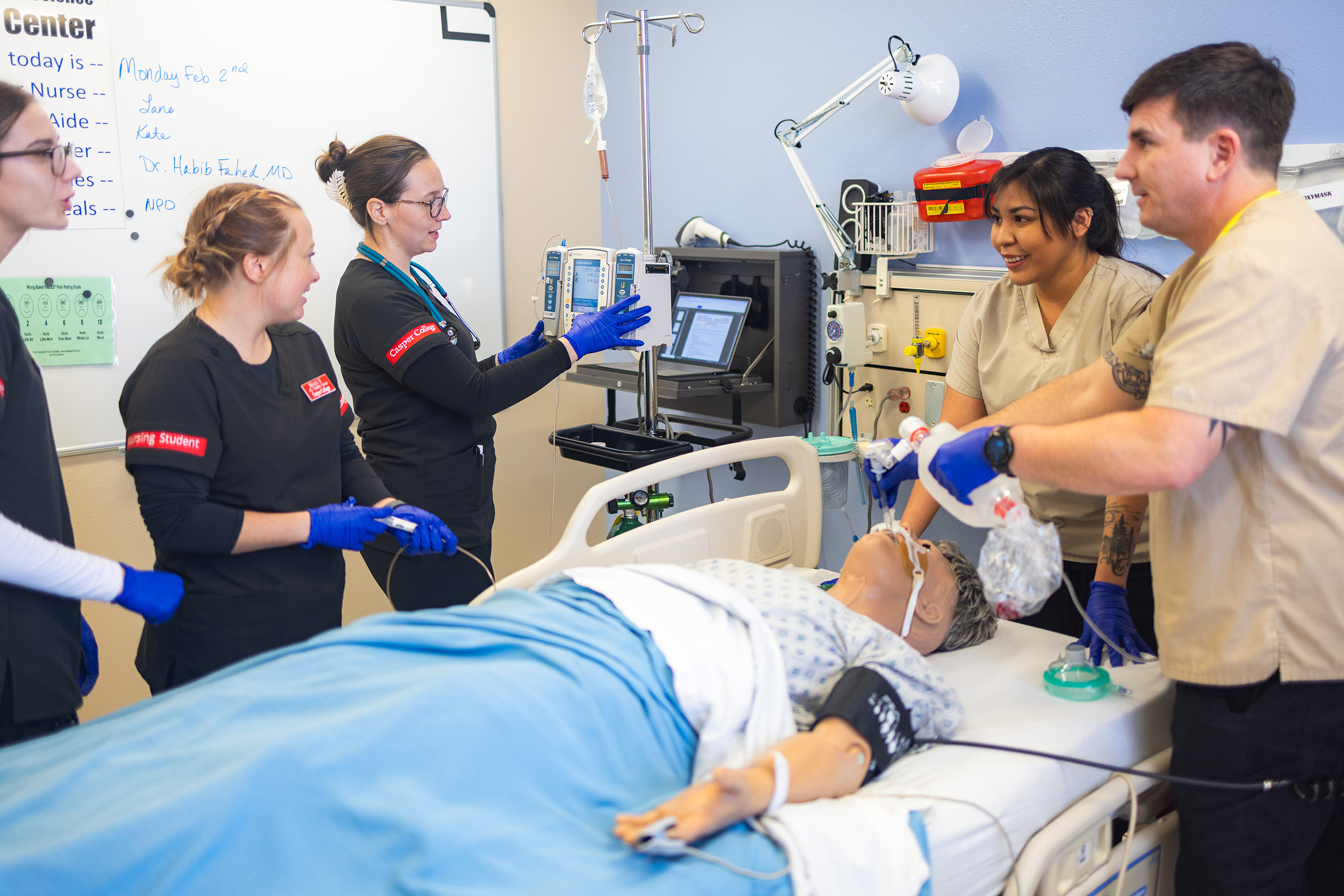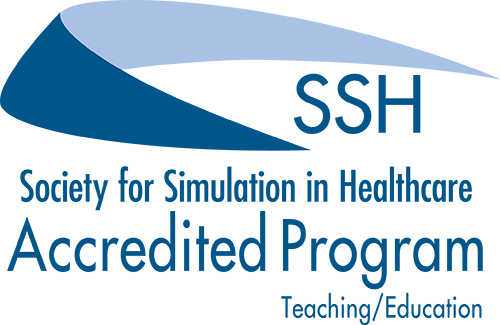
Health Science Simulation Center
HSSC Guidelines
The Basics
The Health Science Simulation Center at Casper College is a shared resource. To ensure that all participants have the best experience possible, activities at the Center are governed by formal Policies and Procedures. Here are some general guidelines derived from those policies and procedures.
Observation and Audiovisual Recording: The Center is equipped with one-way glass, remote cameras, and AV recording equipment. Although recordings are made deliberately, any part of the Center may be under live observation at any time.
Visitors
Welcome! We are grateful for your interest and dedicated to helping you see the Center. For your information:
Tours: We would be delighted to show you around or schedule a tour for you or your group. This can be as simple as a look at the facility or as complicated as a staffed demonstration – just check with staff.
Education Comes First: Please understand that student learning is our priority. Depending on scheduled activities, we may not be able to offer you our undivided attention.
Students
Your simulation experience will typically mimic a clinical rotation or field work. You should prepare accordingly:
Professional Conduct: While you are in the Center, you will be held to the same standards as you would be in a live setting. While you are with or around simulated clients, you will be held to the same standards as you would with any live client. Your communication, your dress, and your behavior should meet clinical or field standards at all times. You should wear a nametag at all times.
Our “Fiction Contract”: Simulation learning depends on participants playing roles. We agree to make your scenarios as realistic as possible and to be clear about what is “actual” and what is “acted”. You agree to willingly suspend disbelief and to participate in the actual as well as the acted.
Evaluations: To help us improve your experience, you’ll be asked to give us feedback after every simulation session. This will be located in your online courses under “Simulation Program: Students”.
Confidentiality: You are expected to hold simulation learning experiences in confidence among your student teams and instructors. This includes written or recorded information in any format, and observations and experiences during simulation sessions. Sharing of this information with students outside the boundaries of the simulation learning will be regarded as academic dishonesty.
Faculty
The Center and staff are dedicated to enhance student learning in all Health Science programs:
Scheduling: In order to maximize utilization and efficiency, we house our scheduling system with college online courses. If you are not enrolled in a course named “Simulation Program: Faculty”, please check with Center staff. From within that course, you can check our availability and make reservation requests for rooms, staff, and/or equipment.
Education: We have many resources to help you learn about simulation pedagogy and to integrate that paradigm into your curriculum. You may also wish to learn the capabilities of the simulators or how to operate the equipment. There are online resources co-located with the scheduling system and we are eager to offer individualized instruction as well.
About
The Health Science Simulation Center (HSSC) is made possible by $2.3 million in federal funding through the United States Department of Labor’s Trade Adjustment Assistance Community College and Career Training (TAACCCT) Grant Program. This state-of-the-art facility is outfitted with modern medical equipment and high-fidelity human patient simulators. Additionally, high-definition audiovisual recording gear provides for in-depth review of learning experiences for instructors and students.
The four labs are usually set up as hospital rooms but can be re-configured to represent other types of settings for students from any Health Science program. Beyond the hospital setting, students may find themselves practicing care for clients in their homes or in an assisted living facility or even on the side of a roadway.
Simulation Education in Healthcare
Simulation is an effective way to train people for high-risk occupations like aviation, nuclear power plant operation, and military roles. In healthcare education, simulation can give students very specific experiences that they might not get in a real-life clinical setting. Simulation also lets students practice complex procedures without any risk of harm to patients. Simulation learning helps students synthesize classroom and clinical experiences — to “tie it all together.”
The NEED
The HSSC provides all health science students with world class simulation experiences to enhance their education and success in acquiring the skills, degrees, and credentials needed for high-wage, high-skill employment while also meeting the needs of employers for skilled workers. Simulation helps students prepare for the complexity of modern healthcare by creating real-world scenarios in a controlled environment without a risk to patients.
It takes well-trained professionals working as a team to provide effective healthcare. At Casper College, the HSSC gives students from different Health Science programs the opportunity to practice team-based care with other professional disciplines before they enter a live clinical setting.
Program Goals and Outcomes
In 2012, Casper College was awarded a four-year, $2.3 million Trade Adjustment Assistance Community College and Career Training (TAACCCT) Grant from the Department of Labor to fund the implementation of the Health Science Simulation Center (HSSC). The TAACCCT Grant Program provides community colleges and other eligible institutions of higher education with funds to expand and improve their ability to deliver education and career training programs that can be completed in two years or less, are suited for workers who are eligible for training under the TAA for Workers program, and prepare program participants for employment in high-wage, high-skill occupations.
A shortage of healthcare professionals is a persistent problem in Wyoming and in an effort to address this issue Casper College chose to focus this grant on enhancing healthcare training programs that students can complete in two years or less. Based on medical provider surveys collected over four years, analysis of current literature, and current industry standards, Casper College determined that improvement of the technological infrastructure of their healthcare programs will provide a higher standard of training and better meet the current demands of healthcare education. With the addition of the HSSC, Casper College is building its capacity to provide high quality, industry standard education.
All healthcare programs at Casper College utilize the HSSC to train students in realistic settings where they learn core skills, how to react in a safe environment and in a full range of healthcare delivery situations. In addition, the HSSC is able to offer clinical practice to more students in an improved educational setting. Through participation in these enhanced programs our graduates will be highly qualified candidates for employment and will help fill critical healthcare workforce needs in Wyoming.
Greetings from the Health Science Simulation Center
Our mission is to improve healthcare practice by elevating the understanding, skills, and collaboration of students and professionals through informed, multimodal, interprofessional simulation education in a state-of-the-art facility.
Our vision is to be an accredited provider of healthcare simulation education and to be recognized as contributing to the competent, confident, reflective, and ethical practice of healthcare professionals.
We are fully accredited in the area of Teaching/Education by the Society for Simulation in Healthcare.
Contact Info
Lupe Kerr
Academic Assistant, School of Health Science
Dino Madsen
Dean, School of Health Science

